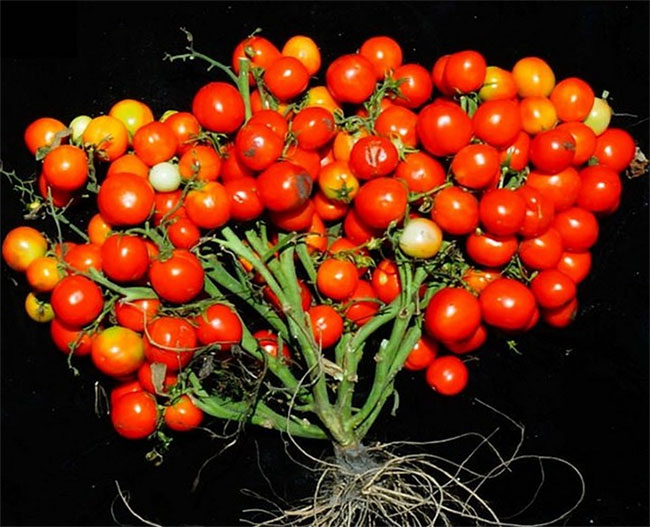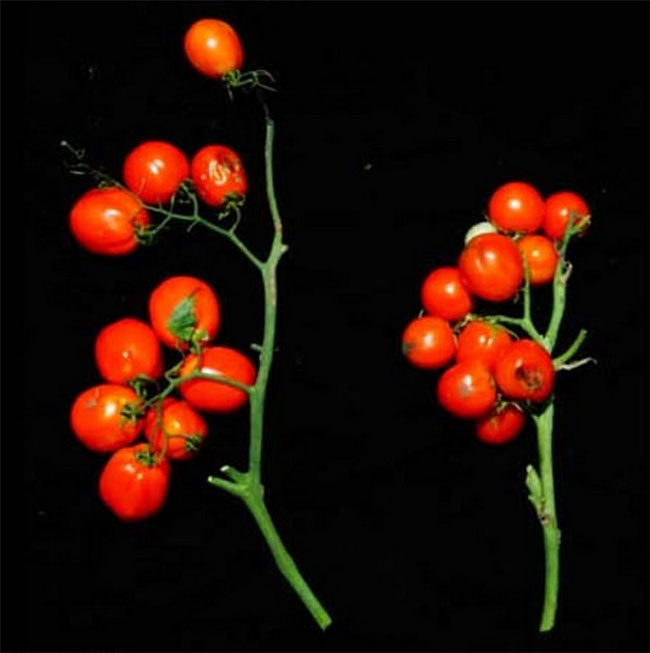Genetically engineered tomatoes produce a bunch of grapes-like fruits to shorten the harvest time, increasing yield
US scientists have recently found a way to edit the gene of tomatoes, this fruit can grow into clusters of luxuriant like grapes, instead of developing into vines as before.
The idea that one day astronauts can enjoy fresh fruit is coming very close. However, fruits like tomatoes with vines will certainly take up a lot of space on the space station. Not to mention that this is also a difficult plant.
Now, however, scientists have successfully developed a genetically modified tomato variety that will allow them to grow into clusters and occupy less space. This achievement promises to promote the development of new varieties of plants, giving higher yields while not taking up too much space.
According to Dailymail , in order to get genetically modified tomatoes and grow into clusters like grapes, scientists from Cold Spring Harbor Laboratory, the US had to meticulously meticulously correct the genetics of the tomato plants sour by CRISPR technology.
In tomato there are two genes, Self Pruning and SP5G . These are two genes that control the growth and flowering, fruiting of tomato plants. However, there is a third gene, Sier, that controls the length of the trunk. If you modify the first two genes, the tomatoes will have less fruit and taste very bad. That's why the scientists decided to edit a third gene with the desire to create a perfectly sized tomato plant.
After editing the third gene, tomatoes not only have a smaller size but also take less time to grow, specifically it only takes about 40 days. Characteristics of this new tomato variety is small, grows in clusters and has uniform ripeness."They have small shapes and sizes, of course they taste good, but it depends on the taste of each person," the author said .


Tomatoes after gene editing are smaller in size and have more fruit.

The flowers of the common tomato plant (on the left) and the tomato of the genetically modified tomato (on the right) are completely different
"This genetic modification shows that we can produce crops in new ways without having to plow, " says author and biologist Zach Lippman from Cold Spring Harbor Laboratory. cultivate the soil or add too much fertilizer. This is an animal approach that helps feed humans and reduce CO2 emissions. "
Climate change will change the conditions for growing on Earth and have a major impact on crops. Not to mention that if humans want to conquer the universe, we will have to learn how to produce food and food. With extreme conditions outside the Earth, it is clear that creating new varieties of high-yielding, saving plantations will be a top priority.
The team hopes their genetic engineering will pave the way for genetically engineered experiments on other fruit trees like kiwi. Professor Lippman believes that, if the harvest time for agricultural products can be further shortened while achieving high productivity, it will open up a clean agriculture and rise to new heights.
NASA has long studied how to plant trees in space. Many experiments on the ISS have been conducted to understand how plants grow in a zero-gravity environment. However, the difficulties do not stop at climatic conditions but also in soil issues.
Because the soil on Mars is likely to be difficult to grow because they contain harmful compounds such as perchlorate. So until humans can live and settle outside of Earth, we will have to solve many other complex problems related to plants.
Research on genetically modified tomatoes was recently published in Nature Biotech.
- Development of genetically modified purple tomato variety rich in anthocyanin
- How to distinguish normal and transgenic tomatoes?
- Tomato plants produce two-color fruits
- Instructions on how to grow and care for cherry tomatoes that produce fruits throughout the year
- Tomatoes are fruits or vegetables? Many questions sometimes cause a lot of controversy
- The origin of cheap green grapes in Hanoi
- 18 reasons to use tomatoes
- Research and preserve fruits after harvest
- Strange tomatoes: Passion like passion fruit, pineapple pineapple
- 'Very good' tomato varieties produce tens of thousands of fruit per tree
- New techniques to intensify winter tomatoes
- Why fruits ripen and flowers die
- These fruits are easily nutritious when stored in the refrigerator
- Wine made from ... tomatoes
 Why do potatoes have eyes?
Why do potatoes have eyes? 'Tragedy' the world's largest carnivorous life: Death becomes ... public toilet
'Tragedy' the world's largest carnivorous life: Death becomes ... public toilet Tomatoes were once considered 'poisonous' for 200 years
Tomatoes were once considered 'poisonous' for 200 years Detecting microscopic parasites on human face
Detecting microscopic parasites on human face